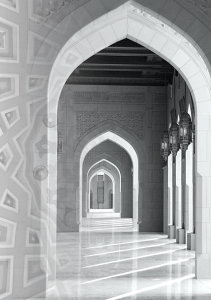
The term Istikhara generally refers to the Istikhara Dua made after the prayer and and not to a different means of praying.
Any wise person would seek the counsel of another whom they saw as more knowledgeable on a matter, or concerning a decision they needed to take or a course of action they needed to follow.
When it comes to what the future holds, only Allah knows what lies ahead, and so the Istikhara Dua is a means of seeking Allah’s uniquely perfect guidance on the appropriate course of action for a given matter. Indeed, the Dua is a means by which a Muslim can attain peace of mind and feel reassured knowing that whatever the outcome of one’s decision, it will always be the best possible result.
Further, the Istikhara Dua is an expression of how a Muslim puts his or her trust in Allah – the All-Knowing, the All-Powerful. Indeed, Istikharah is to ask Allah for guidance in navigating what He has already decreed to happen.
How to Pray Istikhara
Salat ul Istikhara, which translates into “Prayer of Seeking Counsel,” consists of praying two units of prayer (each unit is called a Raka’ah in Arabic) and then following these two Rak’ahs by reading or reciting the Istikhara supplication.
It should be noted that these two Rak’ahs are no different to any other Rak’ahs that make up supererogatory prayers.
Evidence for the Istikhara Dua comes from different authentic narrations. The following is one of them:
“Whenever you are concerned about a choice you must make or a course of action you want to take, then offer two Rak’ahs and then say (dua)…
Hadeeth collected by Al Bukhari, Jabir Ibn ‘Abdullah
Istikhara Dua
English Translation
“O Allah, I seek Your counsel through Your knowledge and I seek Your assistance through Your might and I ask You of Your immense favour, for indeed You alone decree fate while I do not, and You (alone) know (all things) while I do not, and You alone possess all knowledge of the Unseen. O Allah, if You that know this matter ( articulate matter) to be good for me as pertains to my religion, my life and livelihood and to the final outcomes of my affairs, then decree it for me, facilitate it for me, and then bless it for me. But if You know this matter to be harmful to me as pertains to my religion, my life and livelihood and to the final outcomes of my affairs, then distance it from me and distance me from it, then decree what is good for me – wherever it may be – and content me with it.”
Al Bukhari and others
Arabic
اللَّهُمَّ إنِّي أسْتَخِيرُكَ بعِلْمِكَ، وأَسْتَقْدِرُكَ بقُدْرَتِكَ، وأَسْأَلُكَ مِن فَضْلِكَ العَظِيمِ؛ فإنَّكَ تَقْدِرُ ولَا أقْدِرُ، وتَعْلَمُ ولَا أعْلَمُ، وأَنْتَ عَلَّامُ الغُيُوبِ، اللَّهُمَّ إنْ كُنْتَ تَعْلَمُ أنَّ هذا الأمْرَ خَيْرٌ لي في دِينِي ومعاشِي وعَاقِبَةِ أمْرِي – أوْ قالَ: عَاجِلِ أمْرِي وآجِلِهِ – فَاقْدُرْهُ لي ويَسِّرْهُ لِي، ثُمَّ بَارِكْ لي فِيهِ، وإنْ كُنْتَ تَعْلَمُ أنَّ هذا الأمْرَ شَرٌّ لي في دِينِي ومعاشِي وعَاقِبَةِ أمْرِي – أوْ قالَ: في عَاجِلِ أمْرِي وآجِلِهِ – فَاصْرِفْهُ عَنِّي واصْرِفْنِي عنْه، واقْدُرْ لي الخَيْرَ حَيْثُ كَانَ، ثُمَّ أرْضِنِي قالَ: «وَيُسَمِّي حَاجَتَهُ
Transliteration
Allahumma innee astakheeruka bi ilmika wa-astaqdiruka biqudratika wa-as’aluka min fadhlika al-adheem. Fa innaka taqdiru walaa aqdiru. Wa ta’lamu walaa a’alamu wa anta allaamul ghuyoob. Allahumma in kunta ta’lamu anna haadhal-amr (mention your concern) khayrun liy fiy deeniy wa-ma’aashiy wa-‘aaqibati amriy, faqdur hu liy wa-‘yassar hu- liy thumma baarik liy feehi. Wa in-kunta ta’lamu anna haadhal amr sharrun liy fiy deeniy wa-ma’aashiy wa-‘aaqibati amriy. Fa-srifhu ‘annee wa-srifni ‘anhu. Wa aqdur lial khayra haythu kaana thumma a-rdhiniy bihee
Commentary
As is clear from the above, the Istikhara Dua brings together Allah’s attributes of knowledge, power and graciousness; just as it urges a Muslim to place their faith in Allah for exactly these attributes. It also focuses a Muslim’s attention on what he or she should be concerned with, and implies that frivolous matters that have no bearing on one’s welfare in this life or the next should not be of any concern.
As the Dua indicates, a Muslim asks Allah to decree, facilitate and bless any matter or decision that will bring benefit. If Allah decrees something, it must happen; if He facilitates it, it will happen without difficulty; and if He blesses it, its benefit will become more abundant.
Notice how the supplication asks Allah to distance harm from us and also to distance us from harm. To distance harm from us is to ward it off or prevent it from occurring. To distance us from harm is to remedy any attachment or inclination that we might have for a decision that is harmful or for an undertaking that will bring harm.
Finally, the Dua tell us to ask Allah to decree what is good for us, no matter where or what it might be, and to bless us with acceptance and contentment with the good that He decrees. Clearly, to accept and be contented with what Allah decrees brings happiness and reassurance in all our affairs and peace of mind in our decisions.
Quran – 2:45
وَاسْتَعِيْنُوْا بِالصَّبْرِ وَالصَّلٰوةِ ۗ وَاِنَّهَا لَكَبِيْرَةٌ اِلَّا عَلَى الْخٰشِعِيْنَۙ
And seek help through patience and prayer, and indeed, it is difficult except for the humbly submissive [to Allah ]
Reference: English Quran